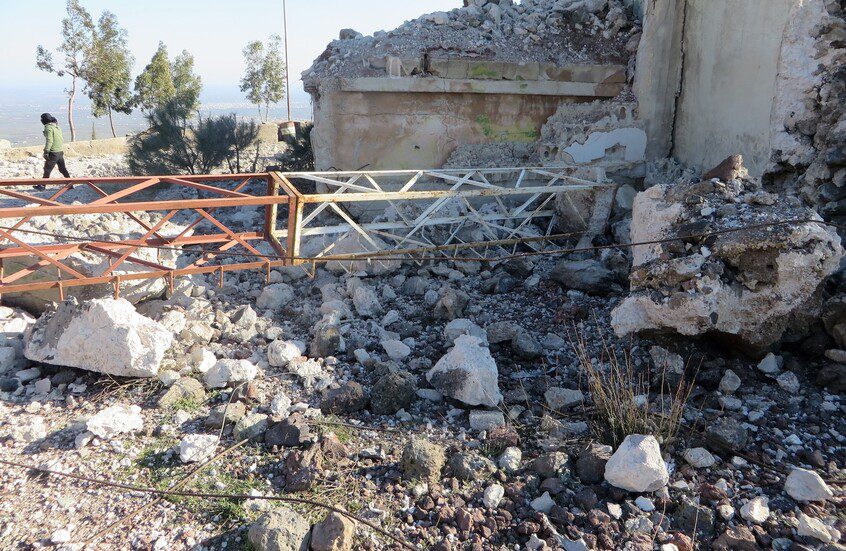The UAE strongly condemned the Israel repeated attacks on Syria, reaffirming its commitment to Syria’s unity, stability, and territorial integrity.
Israel Attacks Syria Risk Further Escalation
In a statement, the UAE Ministry of Foreign Affairs described the Israeli attacks as an aggression against Syria sovereignty and a violation of international law.
Particularly the Disengagement Agreement between Israel and Syria signed in 1974.
The ministry emphasized the UAE’s outright rejection of such actions.
Warning that they risk further escalation and tension in the region and hinder international efforts to achieve peace and stability.
Israeli air forces carried out strikes near the Syrian presidential palace early Friday morning.
Following warnings from Syrian authorities against advancing toward villages inhabited by members of the Druze community in southern Syria.
Why Israel Is Cautious of the New Syrian Government
1. Extremist Background and Rebranding Efforts
Ahmed al-Sharaa, also known as Abu Muhammad al-Julani, previously led Hayat Tahrir al-Sham (HTS), an Islamist group with origins in al-Qaeda.
Although he has attempted to distance himself from his jihadist past by adopting a more moderate political stance and emphasizing national unit, Israeli officials remain skeptical.
They fear that this rebranding may be a strategic move to gain international legitimacy while maintaining underlying extremist ideologies.
2. Concerns Over Minority Rights
Israel is particularly concerned about the safety of minority groups in Syria, such as the Druze, Alawites, and Christians.
Recent sectarian clashes, especially involving the Druze community, have heightened these concerns.
Israel has conducted airstrikes near the Syrian presidential palace and deployed troops to southern Syria.
Citing the protection of the Druze population as a primary motive.

3. Delayed Democratic Processes
The new Syrian leadership has indicated that elections may not occur for up to four years.
With a new constitution potentially taking three years to draft.
Israeli officials view this delay as undemocratic and worry that it may entrench authoritarian rule under the guise of a transitional government.
4. Military Activities Near Israeli Borders
Israel is wary of Syrian military movements near its borders, particularly in the Golan Heights region.
Despite al-Sharaa’s assurances to respect the 1974 disengagement agreements, Israeli forces have taken preemptive measures, including airstrikes and ground deployments, to prevent potential threats from materializing .
Overview of Syria-Israel Relations under Bashar al-Assad (2000–Present)
Syria and Israel have never normalized relations.
Since Bashar al-Assad came to power in 2000, the two countries have technically remained in a state of war.
Though there were no major direct conflicts until the civil war began.
Several rounds of indirect peace negotiations took place in the early 2000s.
Mostly mediated by Turkey or the U.S., focusing on the Golan Heights.
These talks collapsed due to mutual distrust and Syria’s unwillingness to abandon its support for Hezbollah and other groups.

Israel Attacks A Nuclear Reactor in Syria
One of the major flashpoints was Israel attacks on a suspected nuclear reactor in Deir ez-Zor, Syria in 2007.
Syria never retaliated directly, but the incident deepened mistrust and showcased Israel’s readiness to act unilaterally.
Syria also had military control over Lebanon until 2005 and remained a major backer of Hezbollah.
This positioned Syria as a critical player in anti-Israel strategy, even without direct confrontation.
During the civil war (2011–), Israel largely stayed out of Syria’s internal affairs but launched hundreds of attacks on Iranian and Hezbollah targets in Syria.
Israel did not want Assad to fall entirely but also didn’t want him strong enough to resume regional ambitions.
Israel views Bashar al-Assad’s Syria as a hostile actor, but its caution today is more about Iran’s entrenchment, proxy militias, and regional unpredictability than about conventional warfare with the Syrian army.
Even as Assad regains territorial control, Israel will likely continue its “shadow war” approach: limited military actions to prevent strategic threats.
While avoiding a direct, full-scale conflict.





